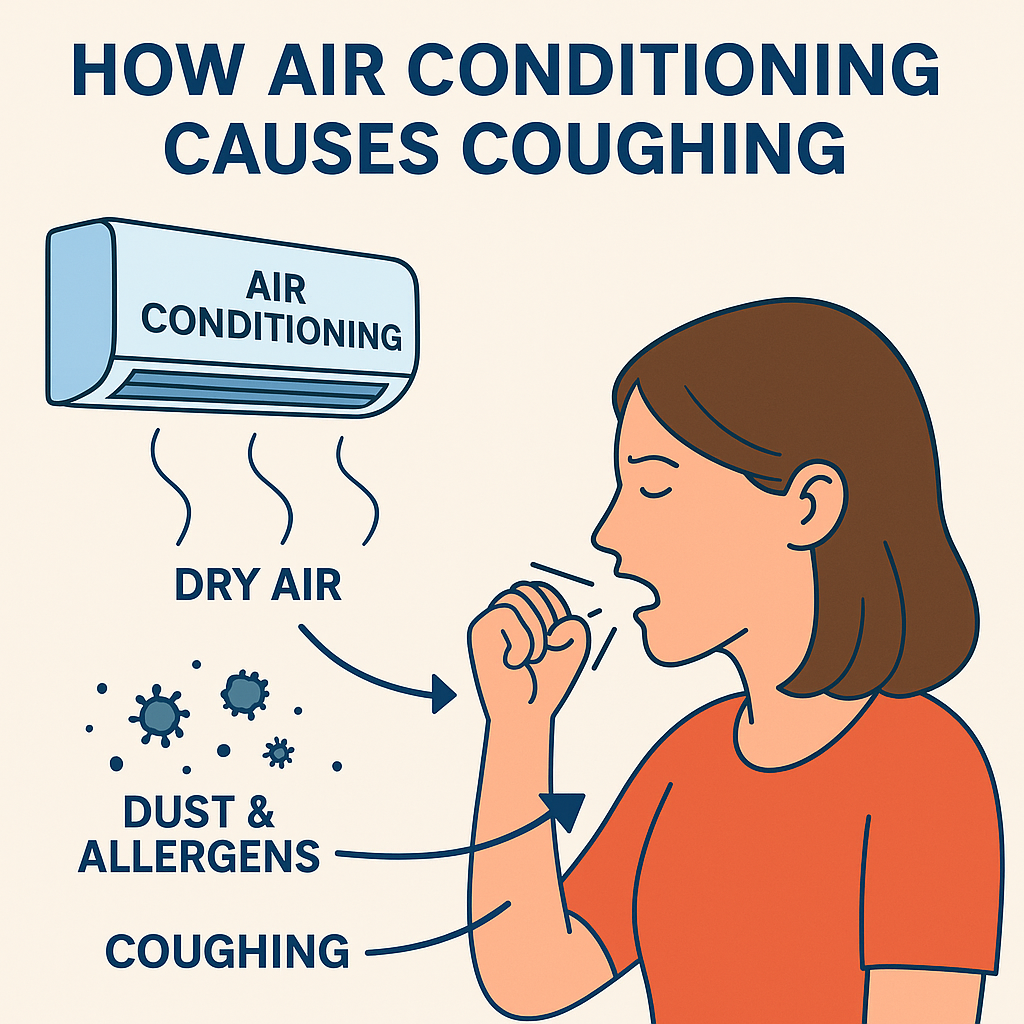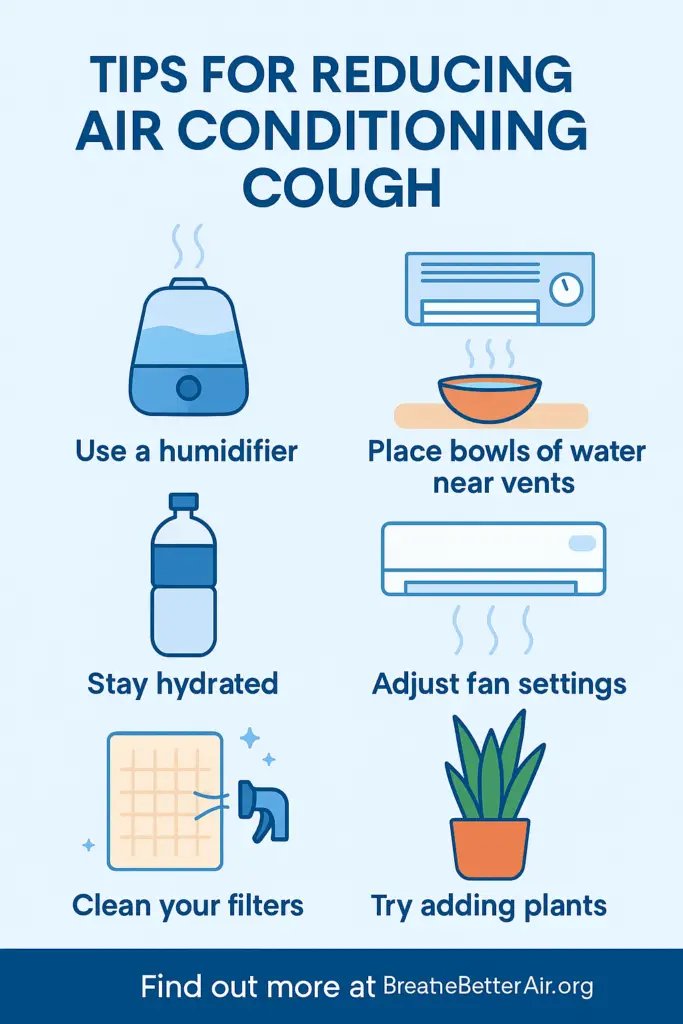Yes, air conditioning can make you cough or sneeze. It dries out the air, irritates your throat, and circulates dust, allergens, or even mold — all of which can trigger respiratory symptoms.
Table of Contents
Why Does Air Conditioning Make You Cough?
If you’ve ever worked in an office where the AC is blasting so hard you need a jacket in the middle of summer — you’re not alone. My boss keeps it freezing, and the guy next to me sneezes so often that no one even says “bless you” anymore. Turns out, there’s a reason all this cold air makes us cough, sneeze, and feel miserable. Let’s break down why it happens — and how to fix it without starting a thermostat war.

Common Reasons Why AC Makes You Cough
It’s not just one thing — air conditioners affect your body in a few different ways. From dry air to dust and even mold, here’s a breakdown of what might be triggering your cough every time the AC kicks on.
1. Dry Air
AC units pull moisture out of the air to cool it down, but that leaves your throat and nasal passages parched. And dry tissues get irritated fast.
- Why it matters: Dry air irritates the mucous membranes in your throat and nose.
- What to do: Use a humidifier, drink plenty of water, and avoid blasting the AC directly at your face.
2. Dust and Allergens
Your AC doesn’t just move air — it moves whatever’s in that air, including dust, pollen, pet dander, and other allergens. If the filters are dirty, it’s even worse.
- Why it matters: Allergens can trigger coughing fits, sneezing, or even asthma symptoms.
- What to do: Clean or replace filters regularly and consider using a HEPA air purifier nearby.
3. Mold and Bacteria
Inside the AC or ducts, moisture can build up — the perfect breeding ground for mold and bacteria. If you’re breathing that in, it can definitely make you cough.
- Why it matters: These microbes can cause throat irritation or allergic reactions.
- What to do: Schedule regular AC maintenance, and make sure humidity levels in your home stay under 50%.
4. Cold Air Blast
Some people are sensitive to that icy air hitting them in the face. Your body senses it as an irritant and responds with a cough reflex.
- Why it matters: The sudden temperature change causes your airways to tighten.
- What to do: Adjust the vents so the air isn’t blowing directly on you and raise the thermostat a couple degrees.
5. Pre-Existing Respiratory Issues
If you’ve got asthma, allergies, or chronic bronchitis, you’re probably more sensitive to all of the above. AC can make things worse fast.
- Why it matters: Your airways are already inflamed, and AC just adds more triggers.
- What to do: Talk to your doctor, consider an indoor air monitor, and create a personalized comfort zone at home.

Tips for Reducing Air Conditioning Cough
If your AC is making you cough, don’t worry — you don’t have to suffer through the summer or start thermostat wars at work. Here are some practical tips to add moisture back into the air and keep irritants from building up.
- Use a humidifier: A simple tabletop humidifier can make a huge difference in how your throat feels, especially if you run the AC at night.
- Place bowls of water near vents: No humidifier? No problem. Placing bowls of water near AC vents lets moisture slowly evaporate into the air.
- Stay hydrated: Drink more water than usual when the AC is running. It helps keep your throat and nasal passages from drying out.
- Adjust fan settings: Set the AC to “auto” instead of “on” or “continuous.” This gives the system breaks and reduces how dry the air gets.
- Clean your filters: Dirty filters can clog airflow and make the air feel more stale and dusty. Check them monthly and replace as needed.
- Try adding plants: Some indoor plants (like peace lilies or snake plants) can naturally add moisture and filter the air at the same time.

Frequently Asked Questions
1. Why does air conditioning make me cough?
AC dries out the air, which irritates your throat and respiratory tract. It can also circulate dust, mold, and other irritants that trigger coughing.
2. Can air conditioning worsen existing respiratory conditions?
Yes. People with asthma, allergies, or other respiratory issues may find that AC makes their symptoms worse due to dry air or airborne particles.
3. Is it common to cough more at night with the AC on?
Yes. Overnight exposure to cold, dry air — combined with natural dehydration — can increase coughing and throat irritation while you sleep.
4. How does the temperature setting affect coughing?
Lower settings make the air colder and drier, which can increase coughing. Setting the thermostat a bit higher may reduce irritation.
5. Can dirty air filters contribute to coughing?
Absolutely. Dusty or clogged filters push allergens and debris back into your air, increasing the chance of coughing or sneezing.
6. What maintenance steps help reduce coughing from AC?
Clean your filters monthly, check for mold in ducts or coils, and get a professional checkup once a year to keep things running clean.
7. Will a humidifier help if my AC is drying the air?
Yes. A humidifier can restore moisture to the air and ease dry throat and coughing — especially at night.
8. Are some people more sensitive to air conditioning?
Yes. People with asthma, allergies, or chronic sinus issues tend to be more reactive to cold, dry, or dusty air from AC units.
9. Can AC refrigerant cause coughing?
Not under normal use. But if there’s a refrigerant leak (which is rare), it can affect air quality and cause coughing or other symptoms.
10. Does sitting directly under an AC vent make it worse?
Yes. The cold air hits your face and throat directly, increasing irritation. Try redirecting vents or moving your position.
11. What can I do immediately if AC starts making me cough?
Step away from direct airflow, sip water, and if possible, turn on a humidifier or move to a different room temporarily.
12. How does indoor air quality affect coughing with AC?
Poor air quality — from dust, mold, or chemicals — can get recirculated by your AC and contribute to persistent coughing.
13. Can air conditioning cause a dry cough specifically?
Yes. Dry, itchy, or tickling coughs are very common when exposed to AC air that lacks humidity.
14. What are long-term solutions to this problem?
Use air purifiers, clean your system, manage humidity, and upgrade filters. You may also want to reposition vents or switch AC modes.
15. Should I see a doctor about coughing from air conditioning?
If the cough is ongoing, severe, or comes with other symptoms, talk to a healthcare provider to rule out underlying issues.
If your air conditioner is making you cough, it might be time to give your system a check-up and adjust how you’re using it. Breathing better starts with the air inside your home.





